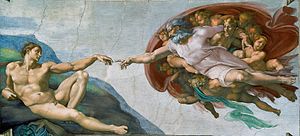The Angel of the
Annunciation 1527 Lorenzo Lotto
There is so much to
consider when trying to unlock the Bible. Firstly, there are many concepts that
are not part of modern understanding. In a science driven society we are told
that if we can’t touch it, it’s not real. However, more people probably accept
rather than disagree that angels are real. Unless we open our mind to
possibilities we will never understand the vast unseen world that surrounds us
and maintains physical life.
Close examination
of some of the words in the bible reveal that there are many unseen spiritual
beings at work in the heavens and in the earth. To gain some understanding of
this we can look back to the work of Dionysius the Areopagite, the anonymous
theologian and philosopher of the late 5th to early 6th century who described
these beings in his work called The Celestial Hierarchy The Austrian philosopher, Rudolf Steiner, also described their functions very
clearly and relateably.
This is what I
wrote several years ago at the beginning of my detailed study on TheRevelation, the last book in the Bible.
“Before we continue we should take a moment to consider the many spiritual beings mentioned in these first six verses of this Revelation of Jesus Christ to John. Our modern intellect has difficulty straddling the concept of beings that are not visible. Although, consider that for some people, God, Jesus Christ and the Devil are perfectly acceptable spiritual beings, and, for some others, angels exist. For the most part we don’t really have adequate images of the different spiritual beings or powers that are an integral and essential part of life in the universe. As we travel through this Revelation we will meet many of these beings and come to understand something of their role in our existence.”
Ed Smith, in his
wonderful reference book, “The Burning Bush” lists them. He explains them in this way,
“Between (the) Trinity and Humanity were the Hierarchies ... The Hierarchies are ninefold, being in three ranks of three. The highest rank comprises, in descending order, and using their names as reflected in scripture, the Seraphim, Cherubim and Thrones; the second rank (though variously ordered by different Christian authorities) comprises the Dominions, Powers and Authorities; and the third rank the Principalities, Archangels and Angels. (Rudolf) Steiner gave each of these a name in keeping with its character in the creative process. The Greek terminology corresponded with the English terms, but it is noteworthy that the Hebrew term for “Authorities,” or for the “Exousiai” in Greek, was “Elohim,” the plural term used for God in Gen 1.”
It is these Elohim
that John refers to in The Revelation when he says “and from the seven spirits
who are before his throne”. See my post about the Elohim Who or what is God?
Many of the
spiritual beings in the Bible are broadly considered to be God. However,
understanding that God can have different expressions gives us a much clearer
picture of the spiritual company we keep. Then we start to see how we are
affected by the actions and functions of these beings who we could say stand
above us (as we stand above plants and animals) yet exist in our environment -
but in a different dimension. We could also say that these beings have a
greater or different experience of the universe than we do.
We should not take
lightly the different ways these beings are referred to, for here we find the
clues to their roles e.g. dominions, powers and authorities.
In the following blogs
I will try to explain the functions of the different beings and show why they are
mentioned in the Bible and how that relates to our life today.














